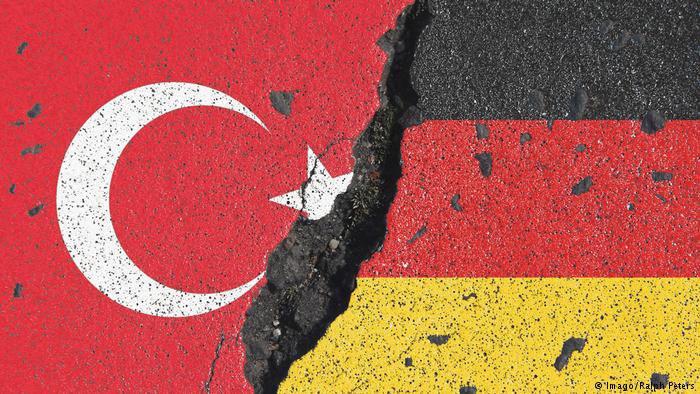Germany, Ankara’s main trading partner and home to a 3 million-person Turkish community, has significant investments in Turkey.
By Thomas Seibert, Arab Weekly
The war in Syria could boost efforts by Turkey and Germany to improve relations after a rough patch marred by Turkish complaints of Islamophobia and the detention of German citizens in Turkey.
Turkey is reaching out to European powers for political and economic support to counterbalance a bitter row with the United States and help amid an escalating financial crisis. Germany, Ankara’s main trading partner and home to a 3 million-person Turkish community, has significant investments in Turkey and regards the country as a gatekeeper preventing an uncontrolled flow of refugees into Europe.
Germany and other EU countries have been shaken by an anti-immigrant backlash following the arrival of hundreds of thousands of Syrian refugees, who reached Europe after crossing to Greece from Turkey in 2015. An agreement between the European Union and Turkey, signed in early 2016, greatly reduced the number of arrivals. Ankara says Europe must do more to help to stem the flow.
German Foreign Minister Heiko Maas used his first visit to Ankara and Istanbul in early September to tell Turkish leaders that Berlin was ready to step up humanitarian aid in case the Syrian crisis triggers another influx of refugees into Turkey.
“Germany is prepared to redouble its humanitarian engagement if there is fighting along a broad front in the region,” Maas said at a news conference September 5 in Ankara.
Maas and Turkish Foreign Minister Mevlut Cavusoglu agreed that an expected offensive by the Syrian government against rebels in Idlib province near the Turkish border could lead to a “humanitarian catastrophe.” Cavusoglu pointed out that “2 million people, maybe more” could cross the border into Turkey, possibly with extremists among them.
“Where can those terrorists go?” Cavusoglu asked. “They can go to Turkey. They can return to their own countries. They can go to other countries. They can also go to Europe.”
Yalcin Akdogan, a lawmaker from the Justice and Development Party of Turkish President Recep Tayyip Erdogan and a former government minister, sent an even blunter warning to the Europeans. “If Idlib crumbles, so does Europe,” Akdogan wrote in the pro-government Star newspaper.
The prospect of a new refugee crisis is one of the reasons Germany and other European countries are determined to improve ties with Ankara, said Halil Karaveli, an analyst at the Institute for Security and Development Policy in Stockholm. “The EU does not want more refugees,” Karaveli said. “Turkey is an important barrier.”
With about 7,000 German companies active in Turkey and with investments worth billions of dollars, German leaders are keen to prevent a deep crisis in Turkey. “They are trying to make sure that Turkey does not go off the cliff economically,” Karaveli said. The finance and economic ministers of both countries are to meet in the coming weeks.
As the refugee issue and economic considerations take centre stage, political differences are pushed aside. Turkey angered Germany by detaining several Germans for what Berlin regarded as political reasons in recent years, prompting the German government to accuse Ankara of using its citizens as “hostages.”
Erdogan said Germany employed “Nazi” methods after it banned election campaign events by Turkish government politicians on German territory. The Turkish government says rising Islamophobia across Europe poses a threat to Turks and other Muslims living there.
The situation calmed somewhat following the release of several high-profile German detainees by Turkey but tensions linger. Some German politicians expressed reservations about a planned state visit by Erdogan in Berlin this month.
Maas, however, said he was ready to let bygones be bygones. “There has to be a stop to that,” he said in Istanbul on September 6. He also conceded there were still outstanding issues. Germany says seven of its citizens are imprisoned in Turkey for political reasons and others are subject to a travel ban and are not allowed to go home. Talks between Maas and Cavusoglu did not produce a breakthrough.
Cavusoglu also rejected Maas’s demand that Turkey “deliver” before any normalisation of ties could begin.
European officials say Turkey’s government has become more autocratic in recent years and has rolled back democratic reforms undertaken under Ankara’s bid to join the European Union. Ankara responds by saying the European Union fails to account for Turkey’s need to defend itself from forces trying to bring down the government. “There can be no precondition for normalisation,” Cavusoglu said during the news conference in Ankara.
Karaveli said Germans and other Europeans should limit their expectations in dealing with Turkey and should not demand a return to EU-inspired policies of reform to strengthen the rule of law and basic rights like free speech. “European partners [of Turkey] need to understand that the Turkish state feels under threat,” he said.
“The state will not do anything that could jeopardise its security,” Karaveli added. “To expect rule of law reforms is not realistic.”









